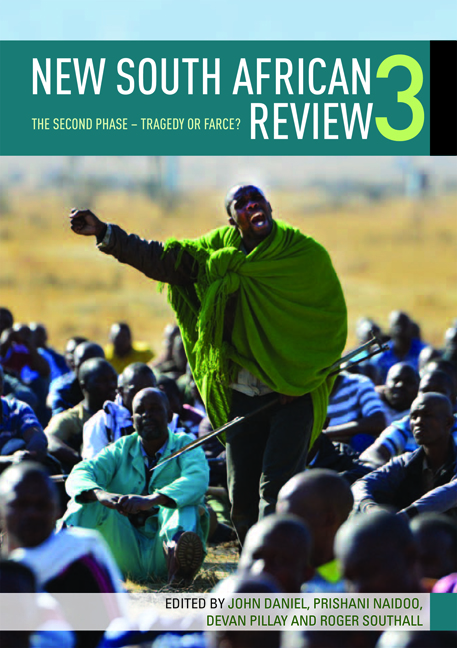Book contents
- Frontmatter
- Contents
- Preface
- Introduction: The second phase – tragedy or farce?
- PART 1 Party, Power and Class
- PART 2 Ecology, Economy and Labour
- PART THREE Public Policy and Social Practice
- PART 4 South Africa at Large
- Introduction: South Africa at large
- Chapter 15 South Africa and the BRIC: Punching above its weight?
- Chapter 16 The Swazi Nation, the Swazi government and the South African connection
- Contributors
- Index
Chapter 15 - South Africa and the BRIC: Punching above its weight?
from PART 4 - South Africa at Large
Published online by Cambridge University Press: 31 May 2019
- Frontmatter
- Contents
- Preface
- Introduction: The second phase – tragedy or farce?
- PART 1 Party, Power and Class
- PART 2 Ecology, Economy and Labour
- PART THREE Public Policy and Social Practice
- PART 4 South Africa at Large
- Introduction: South Africa at large
- Chapter 15 South Africa and the BRIC: Punching above its weight?
- Chapter 16 The Swazi Nation, the Swazi government and the South African connection
- Contributors
- Index
Summary
The rationale for South Africa's approach [to join BRIC] was in consideration of a matter of crucial importance to BRIC member states, namely the role of emerging economies in advancing the restructuring of the global political, economic and financial architecture into one that is more equitable, balanced and rests on the important pillar of multilateralism.
SA must not misunderstand the nature of BRIC – it is an acronym dreamt up by orthodox banks based in the global north. BRIC does not have development initiatives emanating from it, unlike the IBSA (India, Brazil and SA) forum; rather it is a grouping about market and economic access.
INTRODUCTION
The years 2010 and 2011 were significant in South Africa's foreign policy outreach. In 2011, Pretoria began its second term as a non-permanent member of the United Nations Security Council for the period 2011 and 2012, and China extended an invitation to the Zuma presidency to attend the Third Heads of State BRIC Summit. This followed a formal invitation from China to South Africa into the coveted BRIC club in December 2010. It was a diplomatic coup for the Zuma administration, and followed months of hard lobbying, and of emphasising the importance and value of South Africa's identity in the global South.
The announcement of South Africa's pending admission as the fifth member of BRICS met with some ambivalent responses. On the one hand, commentators such as Mzukisi Qobo highlighted that South Africa's role globally has ‘made substantial contributions to global governance issues and played a very active role in post-conflict reconstruction in Africa. Its voice has been fluent and it's seen as an honest broker in international relations. That would definitely have some influence’ (Cloete 2011).
On the other hand, there were reservations about what South Africa's membership would bring to the BRIC forum. Jim O'Neill, the former chief economist at Goldman Sachs who coined the term BRIC, argued that Pretoria was an unsuitable candidate to be admitted into this clutch of resurgent or emerging economies, arguing that it was not entirely obvious to [him] why BRIC should have agreed to ask South Africa to join as South Africa could not be regarded as a big economy (Mashego 2011).
- Type
- Chapter
- Information
- New South African Review 3The second phase - Tragedy or Farce?, pp. 297 - 313Publisher: Wits University PressPrint publication year: 2013



